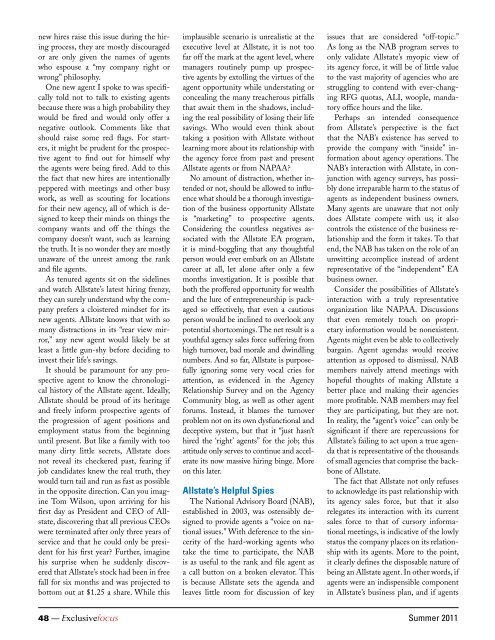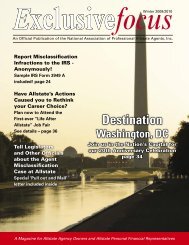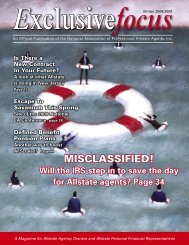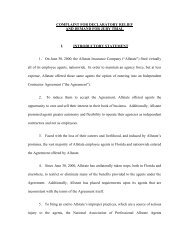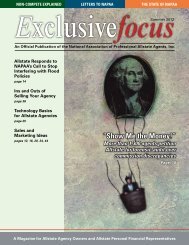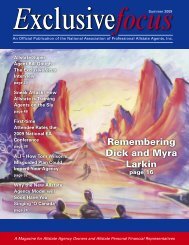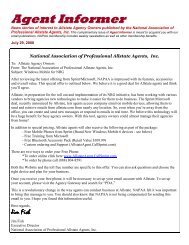NAPAA - National Association of Professional Allstate Agents, Inc.
NAPAA - National Association of Professional Allstate Agents, Inc.
NAPAA - National Association of Professional Allstate Agents, Inc.
Create successful ePaper yourself
Turn your PDF publications into a flip-book with our unique Google optimized e-Paper software.
new hires raise this issue during the hiring<br />
process, they are mostly discouraged<br />
or are only given the names <strong>of</strong> agents<br />
who espouse a “my company right or<br />
wrong” philosophy.<br />
One new agent I spoke to was specifically<br />
told not to talk to existing agents<br />
because there was a high probability they<br />
would be fired and would only <strong>of</strong>fer a<br />
negative outlook. Comments like that<br />
should raise some red flags. For starters,<br />
it might be prudent for the prospective<br />
agent to find out for himself why<br />
the agents were being fired. Add to this<br />
the fact that new hires are intentionally<br />
peppered with meetings and other busy<br />
work, as well as scouting for locations<br />
for their new agency, all <strong>of</strong> which is designed<br />
to keep their minds on things the<br />
company wants and <strong>of</strong>f the things the<br />
company doesn’t want, such as learning<br />
the truth. It is no wonder they are mostly<br />
unaware <strong>of</strong> the unrest among the rank<br />
and file agents.<br />
As tenured agents sit on the sidelines<br />
and watch <strong>Allstate</strong>’s latest hiring frenzy,<br />
they can surely understand why the company<br />
prefers a cloistered mindset for its<br />
new agents. <strong>Allstate</strong> knows that with so<br />
many distractions in its “rear view mirror,”<br />
any new agent would likely be at<br />
least a little gun-shy before deciding to<br />
invest their life’s savings.<br />
It should be paramount for any prospective<br />
agent to know the chronological<br />
history <strong>of</strong> the <strong>Allstate</strong> agent. Ideally,<br />
<strong>Allstate</strong> should be proud <strong>of</strong> its heritage<br />
and freely inform prospective agents <strong>of</strong><br />
the progression <strong>of</strong> agent positions and<br />
employment status from the beginning<br />
until present. But like a family with too<br />
many dirty little secrets, <strong>Allstate</strong> does<br />
not reveal its checkered past, fearing if<br />
job candidates knew the real truth, they<br />
would turn tail and run as fast as possible<br />
in the opposite direction. Can you imagine<br />
Tom Wilson, upon arriving for his<br />
first day as President and CEO <strong>of</strong> <strong>Allstate</strong>,<br />
discovering that all previous CEOs<br />
were terminated after only three years <strong>of</strong><br />
service and that he could only be president<br />
for his first year Further, imagine<br />
his surprise when he suddenly discovered<br />
that <strong>Allstate</strong>’s stock had been in free<br />
fall for six months and was projected to<br />
bottom out at $1.25 a share. While this<br />
implausible scenario is unrealistic at the<br />
executive level at <strong>Allstate</strong>, it is not too<br />
far <strong>of</strong>f the mark at the agent level, where<br />
managers routinely pump up prospective<br />
agents by extolling the virtues <strong>of</strong> the<br />
agent opportunity while understating or<br />
concealing the many treacherous pitfalls<br />
that await them in the shadows, including<br />
the real possibility <strong>of</strong> losing their life<br />
savings. Who would even think about<br />
taking a position with <strong>Allstate</strong> without<br />
learning more about its relationship with<br />
the agency force from past and present<br />
<strong>Allstate</strong> agents or from <strong>NAPAA</strong><br />
No amount <strong>of</strong> distraction, whether intended<br />
or not, should be allowed to influence<br />
what should be a thorough investigation<br />
<strong>of</strong> the business opportunity <strong>Allstate</strong><br />
is “marketing” to prospective agents.<br />
Considering the countless negatives associated<br />
with the <strong>Allstate</strong> EA program,<br />
it is mind-boggling that any thoughtful<br />
person would ever embark on an <strong>Allstate</strong><br />
career at all, let alone after only a few<br />
months investigation. It is possible that<br />
both the pr<strong>of</strong>fered opportunity for wealth<br />
and the lure <strong>of</strong> entrepreneurship is packaged<br />
so effectively, that even a cautious<br />
person would be inclined to overlook any<br />
potential shortcomings. The net result is a<br />
youthful agency sales force suffering from<br />
high turnover, bad morale and dwindling<br />
numbers. And so far, <strong>Allstate</strong> is purposefully<br />
ignoring some very vocal cries for<br />
attention, as evidenced in the Agency<br />
Relationship Survey and on the Agency<br />
Community blog, as well as other agent<br />
forums. Instead, it blames the turnover<br />
problem not on its own dysfunctional and<br />
deceptive system, but that it “just hasn’t<br />
hired the ‘right’ agents” for the job; this<br />
attitude only serves to continue and accelerate<br />
its now massive hiring binge. More<br />
on this later.<br />
<strong>Allstate</strong>’s Helpful Spies<br />
The <strong>National</strong> Advisory Board (NAB),<br />
established in 2003, was ostensibly designed<br />
to provide agents a “voice on national<br />
issues.” With deference to the sincerity<br />
<strong>of</strong> the hard-working agents who<br />
take the time to participate, the NAB<br />
is as useful to the rank and file agent as<br />
a call button on a broken elevator. This<br />
is because <strong>Allstate</strong> sets the agenda and<br />
leaves little room for discussion <strong>of</strong> key<br />
issues that are considered “<strong>of</strong>f-topic.”<br />
As long as the NAB program serves to<br />
only validate <strong>Allstate</strong>’s myopic view <strong>of</strong><br />
its agency force, it will be <strong>of</strong> little value<br />
to the vast majority <strong>of</strong> agencies who are<br />
struggling to contend with ever-changing<br />
RFG quotas, ALI, woople, mandatory<br />
<strong>of</strong>fice hours and the like.<br />
Perhaps an intended consequence<br />
from <strong>Allstate</strong>’s perspective is the fact<br />
that the NAB’s existence has served to<br />
provide the company with “inside” information<br />
about agency operations. The<br />
NAB’s interaction with <strong>Allstate</strong>, in conjunction<br />
with agency surveys, has possibly<br />
done irreparable harm to the status <strong>of</strong><br />
agents as independent business owners.<br />
Many agents are unaware that not only<br />
does <strong>Allstate</strong> compete with us; it also<br />
controls the existence <strong>of</strong> the business relationship<br />
and the form it takes. To that<br />
end, the NAB has taken on the role <strong>of</strong> an<br />
unwitting accomplice instead <strong>of</strong> ardent<br />
representative <strong>of</strong> the “independent” EA<br />
business owner.<br />
Consider the possibilities <strong>of</strong> <strong>Allstate</strong>’s<br />
interaction with a truly representative<br />
organization like <strong>NAPAA</strong>. Discussions<br />
that even remotely touch on proprietary<br />
information would be nonexistent.<br />
<strong>Agents</strong> might even be able to collectively<br />
bargain. Agent agendas would receive<br />
attention as opposed to dismissal. NAB<br />
members naively attend meetings with<br />
hopeful thoughts <strong>of</strong> making <strong>Allstate</strong> a<br />
better place and making their agencies<br />
more pr<strong>of</strong>itable. NAB members may feel<br />
they are participating, but they are not.<br />
In reality, the “agent’s voice” can only be<br />
significant if there are repercussions for<br />
<strong>Allstate</strong>’s failing to act upon a true agenda<br />
that is representative <strong>of</strong> the thousands<br />
<strong>of</strong> small agencies that comprise the backbone<br />
<strong>of</strong> <strong>Allstate</strong>.<br />
The fact that <strong>Allstate</strong> not only refuses<br />
to acknowledge its past relationship with<br />
its agency sales force, but that it also<br />
relegates its interaction with its current<br />
sales force to that <strong>of</strong> cursory informational<br />
meetings, is indicative <strong>of</strong> the lowly<br />
status the company places on its relationship<br />
with its agents. More to the point,<br />
it clearly defines the disposable nature <strong>of</strong><br />
being an <strong>Allstate</strong> agent. In other words, if<br />
agents were an indispensible component<br />
in <strong>Allstate</strong>’s business plan, and if agents<br />
48 — Exclusivefocus Summer 2011


